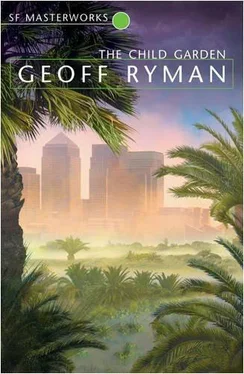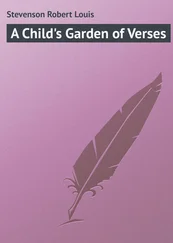And Rolfa, even she was lost. Rolfa, they even have you. They have your voice, they have your mind, they can make you speak when they want you to. I gave you to them. So why am I holding back my memories of you? Let them have those.
I am going to have to find another way to fight.
Milena relinquished her claim. She remembered Rolfa for the Consensus.
Milena remembered being lost in the dark in the Graveyard. Loose threads of old dead costumes strayed across her face and blistered sequins were rough under her fingers.
There was music playing, insanely loud. The music was Das Lied von der Erde. The words told a kind of ghost story.
Milena was sucking her finger, sick at heart with fear, fear of being ill again, of losing more of herself. She was lost in the dark, more frightened than she need be, because it reminded her of all the other ways in which she was lost. It reminded her that no one would notice she was gone. And the voice, high and sweet and sad, was a woman’s voice, reminding her that she needed love.
So the dark around her was haunted. Don’t be silly, she told herself, what do you think it is, an orchestra of ghosts? She scraped her head on brick, looked through an arch and saw a light on the wall. She saw there was no room for an orchestra. It was obvious what was playing; if she could have thought clearly she would have known that it was a recording. But she was too frightened of life and of herself to think clearly. Milena remembering felt pity for Milena the actress. The actress knelt and pulled back a curtain of old clothes.
Trouble, thought Milena the actress. Trouble, thought the Milena who remembered. Trouble, seeing the mound of papers, the mess, the shrieking music, and the slumped, dazed brute of a Polar Bear. There was disorder there.
Ewig blauen licht die Fernen
Everywhere and eternally, the distance shines bright and blue.
In the music, someone who might already be dead was departing with regret and sadness. The dead are more afraid than the living, and in some ways they are more alive.
The GE stirred herself with a kind of convulsion as if she had almost settled into death herself, following the music there. She knocked over paper and plastic cases, as if she were blind. Sadness hung from her face like lead weights, pulling down the flesh under her eyes and around her jaws. The music had been calling for someone. The paper slid away to reveal a box, a small, crude soundbox, made of metal as thin as paper. No wonder the music had hurt when the volume was full up.
To the poor starveling of the Consensus the soundbox was a wonder, and it drew her out of her hiding, out of her fear, as did the soul-sadness on the GE’s face.
‘Where did you get that?’ Milena the actress asked in wonder, though she could hear music any time she liked. Her viruses would sing it for her, out of memory. It was the metal that drew her, the cost of the thing. It was private metal, something owned and therefore more precious, if only to someone else.
‘China, I believe,’ said Rolfa, and Milena could hear the youth in her voice. Youth was plump and fruity, not yet worn by doubt. It still had hope. ‘You wouldn’t happen to have any alcoholic beverages about your person, would you?’
Milena remembering saw that Rolfa was trying to be raffish. She was already trying to charm. She liked me as soon as she saw me, realised the Milena who remembered. She was signalling in a thousand ways.
‘No. I don’t like poisoning myself,’ said the actress, narrow, bitter, expecting defeat.
‘Tuh.’ Rolfa turned away. She was slightly slimmer then, without the pouches of fat on the small of her back. There was something musical in the way she moved. The clumsiness was stricken with feeling. Feeling grew out of her like fur: she bristled with it. Bleary with love and music, she began in a rather rational way to dispose of the mess on her desk.
Milena the actress had felt the first tug, the first little spindle thread of love, but she did not know it. ‘Effendim?’ she said, pained at being ignored. ‘I’ve come to change these boots.’
Already, unknown to either of them, they were together. Their animal selves had recognised it. Their whole lives were there to be read in the way they each smiled and moved. They had already Read each other, but their conscious selves had yet to catch up.
‘You,’ said Rolfa, turning, ‘are a ponce.’ It was said with a kind of honest affection. It was true, and Milena the actress needed to know that other people could see the things she tried to hide.
Milena the actress went cold and shy. She had been seen through again. Her masks were paper-thin. The moment for a reply passed and Rolfa turned away. The actress kept seeing Rolfa through a series of paper masks. Polar woman, rough and tumble. The Bear who Loves Opera, a famous Zoo character. Her conscious self was not seeing Rolfa at all.
‘Bastard.’ the GE murmured to herself.
‘Are you talking to me?’ demanded the actress. You know she’s not, Milena! Why are you looking for injustice?
‘No,’ said Rolfa, turning to smile, holding up a bottle. ‘I was talking to this empty whisky bottle.’ She’s saying she sees through you, but likes what’s on the other side. And she wants, she yearns, for you to like her.
Made bold by the force of attraction, Rolfa threw the whisky bottle away and listened to the breakage, as if extraordinary acts and sudden sounds could speak when people could not.
If it was me, now, Rolfa, I’d laugh and ask your name. I’d sit beside you and let you know that I already thought you were wonderful, that I didn’t mind the fur or the teeth or the rotting shoes. We’d sit and talk for hours about music, and I’d say, let’s go out for a drink if you like whisky so much. We’d be friends from the start. And the reason why I could do that now, Rolfa, the reason why I’m different, is you.
I don’t want to remember any more, I don’t want to see the waste and the pain and the waiting. I just want to hold you. I just want to stroke the fur on your arm, and try to save you from what’s coming. And this time I’d do it, this time, I would know how: I wouldn’t let anything go to waste. I’d say, wait until the metal comes and your Family has to make friends with the Consensus. I’d say, be with me from time to time, but don’t run away until you’ve shown them, your father and your sisters, that the music works. And I’d never let you be Read.
Rolfa held up a bottle. ‘God,’ she said, ‘is a distiller.’ She grinned, and Milena the actress saw the horrible teeth and the dandruff and finally relaxed enough to realise that she liked her, liked this strange creature.
‘Do you live here?’ Milena the actress asked, and stepped forward a bit. Amusement suddenly bubbled up through her, and childish wonder, and something sweet that was kept hidden and protected.
Maybe not, maybe I wouldn’t change anything, thought Milena remembering. She ached with love for both of them. Maybe this is the best way for this to happen, as tentative as a spider’s web. Not bold and knowing and businesslike.
A look came over Rolfa’s face, a look Milena remembering now recognised, a look of great tenderness, of simple kindness, of wishing the world were different for them both. Her hair in her eyes made her blink. ‘It would be better if I did,’ she said, ruefully, amused. ‘This is where I hide, instead. Since you don’t like poisoning yourself, perhaps you’d like to look at this.’ She held out the musical scores.
I’d forgotten that, thought the one who remembered. Already the music was being passed between us. The music would unite us and part us and fix us together for all of our lives. The paper was smooth like skin, and still warm from Rolfa’s grasp.
Читать дальше












